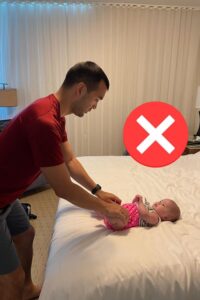
6 Tips to Avoid Back and Neck Pain While Taking Care of Your Infant

As a father to three beautiful girls, I have had my fair share of bath-times, diaper changes, and feedings. And with my youngest being only four months old, I’m reminded that many of these everyday tasks can wreak havoc on your back and neck if not done properly. As a spine surgeon, I’ve also seen these issues pop up for many of my patients who have kids the same age as mine. When it comes down to it, most of them are not using proper techniques to protect their spine while taking care of their little ones. Here are my tips for avoiding back and neck pain for all of those parents and caregivers out there.
6 Tips to Avoid Back & Neck Pain While Taking Care of Your Infant:
1. Diaper Changes
Almost everyone is prepared with a specific location for their baby when it comes to diaper changes. But when you were designing that area, did you keep your back in mind? Make sure the changing table is at a good height so that you don’t have to over-extend your back leaning over the changing pad. Also, make sure you keep the diaper supplies in arm’s reach. By keeping the diapers, wipes, etc. close, you can avoid tweaking your back and neck.


2. Feedings
Whether you’re breastfeeding or bottle-feeding, many moms and dads end up sitting with poor posture by the time their baby is done eating. Try to sit up as straight as you can; slouching over can lead to severe back pain over time. And for moms who are breastfeeding, definitely use a support pillow made for feedings to help lessen the stress on your back from leaning forwards.
3. Lifting Heavy Baby Equipment
Strollers, infant car seats, and all of the baby furniture in between can lead to lots of heavy lifting when taking care of your baby. Make sure to keep your back straight and lift using your legs and hips. If your back is curved and your legs are straight, you are using all of your back muscles to lift the heavy item and are adding a lot of stress to your spine that could lead to a very painful injury. Make sure to also keep the item closer to your body if possible. The further out you hold the item, the more stress you’re putting on your back.
4. Installing Car Seats
Infant car seats have bases that need to be installed, and convertible car seats themselves need to be installed. For most people, you’re having to bend yourself over the car seat in your small backseat, while using a lot of force to make sure you have the latch belt secure and tightly fastened. This is a recipe for disaster, with the disaster being an injured back. The best plan of action is to have someone install the car seat for you. There are private companies that can do this for you, as well as some local governments that have staff dedicated to car seat installations. If you do plan to install your car seat yourself, make sure you don’t overextend when trying to secure the seat. It’s best to keep your body in front of the area you’re trying to tighten and secure.
5. Bath Time


This activity can be the most daunting on parents’ backs and necks since bathtubs are usually at ground level. It’s best to use a memory foam bath mat or bath time-specific pad to help save your knees and avoid added stress to your spine. Also, try to keep your back straight and bend at your hips when leaning into the bathtub. When you curve your spine, you are using more of your back muscles than your core muscles. Your neck will also thank you if you stay closer to eye level to your baby during their bath. The more you have to look down during bath time, the more likely you could develop ‘tech neck’.
6. Baby Wearing
Baby carriers and wraps are very popular because of being able to hold your baby while still having your two hands free. The only downside to carriers and wraps is that you’re making your body take on added weight for a long period of time. This can cause strain on your back and neck because of your body not being used to the added weight. To help alleviate this, make sure to use a carrier or wrap that is approved for the weight of your baby. Also, when choosing a carrier to add to your registry or going to the store to pick one out, look for one that has lumbar support. This one little feature can be the difference between being able to comfortably wear your baby for less than an hour, or being able to wear your baby for hours on end. Also make sure the carrier fits you well, especially where it hits your upper back and neck — make sure you aren’t adding extra stress to your neck that could cause an injury.
Whether you’re a first-time parent or a seasoned veteran, you still have to be aware of your surroundings and your body to avoid injuries when taking care of your newborn baby. Your little one depends on you, and being a parent with neck or back pain can make that job very hard. By following good spine habits during your everyday routines and tasks, you make it less likely to injure yourself. But if you do find yourself suffering from neck or back pain, we are here for you. Schedule a consult with me or one of my colleagues as soon as possible so we can get you an accurate diagnosis and the best treatments for your injury or condition. No pain is too small, and the sooner we can alleviate your symptoms the better. We want you to be able to enjoy your new family member and all of their milestones pain-free!
Topics covered
About the Author
Featured Resources
Insights to Achieve a Pain-Free Life



